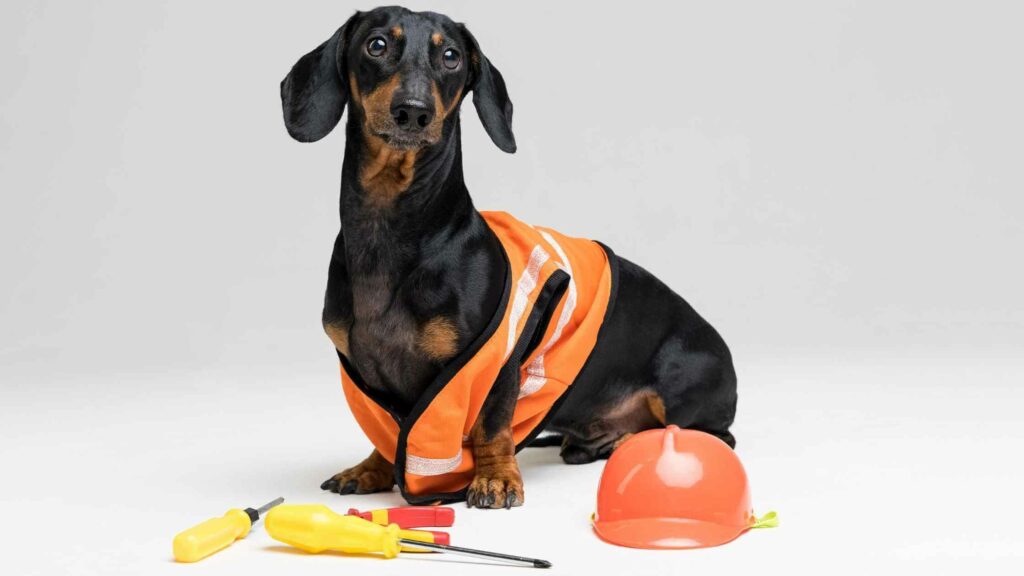
Some dogs are better than others when considering having one as a service dog. But, can a Dachshund be a service dog? If you’re considering using a Dachshund, here’s what you’ll want to know!
There is no reason that a Dachshund can’t be a good service dog, but it will take some training. Service dogs tend to be easy-going, attentive, intelligent, and easy to train. Dachshunds are intelligent and easy-going, but they also can be stubborn and independent. You’ll most often find a Dachshund a better choice as an emotional support dog than a service dog because their small size limits their physical abilities on the job.
Trait requirements for service dogs
While we firmly believe that all types of dogs are great dogs, there will be certain dog breeds that are better suited to be hard-working professionals (aka service dogs). The traits generally required for this important position include:
- Intelligence
- Obedience
- Loyalty
- Easy-going personality
- Steadiness
Dogs who will be used as service dogs will require special training to care for their handler. This is also to ensure that they can hold up under pressure to be a trustworthy, reliable working dog. These traits are the standard ones that professional trainers will look for in their potential students.
Can a Dachshund be a service dog?
Dachshunds do have these kinds of traits, but they often are lacking in obedience because their high intelligence has a tendency to make them stubborn and independent.
While there is nothing wrong with these traits, they’re not great for a service dog! You’ll have to put your Dachshund “through their paces” to guarantee that they’ll react as you’d expect in a crisis on the job.
The other main detail, as mentioned above, is that Dachshunds are small dogs and won’t be capable of helping their handlers with many physical jobs. Since service dogs often do things like open doors, grab objects, and guide their handlers, this is something to think about. It’s not that a Dachshund is inferior; it’s just not in their physical capacity to do something as physically demanding as opening a door!
Can a Dachshund be an emotional support dog?
You’ll find that, with training, a Dachshund can be a wonderful emotional support dog! These are naturally possessive and attentive dogs, so they’ll want nothing more than to be at your side while you’re dealing with your emotions and in need of their services that way.
Emotional support dogs require specialized training, just like service dogs. However, they don’t require certification of any kind. You can rely on whatever animal you want for emotional support.
Many believe that they can choose to train their own emotional support dog. This is true because dogs don’t require official certification to be recognized as emotional support dogs. However, emotional support dogs play important roles, which will require training and adherence to commands taught by an experienced dog trainer.
What’s the difference between a service dog and an emotional support dog?
There’s a lot of confusion between a service dog and an emotional support dog, mainly because many think they’re interchangeable. Realistically speaking, they actually have very different jobs!
A service dog has an official role to offer their handler, and they take on jobs so that their handler can have support and help when needed. These are taught to be a service dog through careful, tested commands, so there’s no chance a dog will disobey or misunderstand. Service dogs play important daily roles in a handler’s life. They are “on-duty” most of the time with very little downtime.
Emotional support dogs are like daily companions that go around with their handlers/owners to different locations and offer low-key support. They are attentive to their handlers but only intervene or interact with them when their owner is emotionally distressed. This doesn’t often require a command or a trigger, just attentiveness.
Emotional support dogs are still thoroughly trained dogs from a professional standpoint. Still, it’s more about how each handler/owner wants to have it done rather than needing to pass certification. Emotional support dogs help their handlers through emotionally distressing and challenging times rather than helping with specific tasks and roles.
Both service dogs and emotional support dogs are professional positions for dogs and equally important! It’s just important to note that one can’t substitute for another.

Are Dachshunds good for anxiety?
Since you now know that Dachshunds can be emotional support dogs, let’s look at how they would offer support for one of the most common requests for an emotional support dog: anxiety.
Dachshunds can be helpful for those who are suffering from anxiety. Whether it’s test anxiety, social anxiety, or general anxiety, emotional support dogs can really help take the edge off and give their handler something to ground them. This is, of course, the entire job of an emotional support dog!
The only thing to be aware of with Dachshunds as far as grounding their handlers through a panic attack is that they, themselves, might be anxious. Dachshunds can be anxious dogs, and it’s possible that your anxiety may increase their anxiety, and they’ll be unable to help calm you down.
This can be tested, however, and retrained through emotional support dog training. This is one of the reasons why you’ll want to formally train your dog to be an emotional support dog! Training also helps you be aware of where your dog naturally struggles, which is good information!
What jobs can Dachshunds do?
There are a lot of jobs that Dachshunds can do, be they service dogs or emotional support dogs. The key is to give them jobs they can do well; otherwise, they’ll fail automatically, which can mean a lot of frustration. Common suitable jobs for Dachshunds include:
- Companionship
- Cuddling
- Playing and distracting
- Calming and soothing
Companionship
Since Dachshunds naturally love being with their humans, these are great companion animals that will simply want to go everywhere with you. This is convenient for obvious reasons! Whether they walk on a leash or you carry them around, they’ll still be alert and focused on your needs.
They are great company to help minimize isolation, depression, anxiety, and more. They are calm, steady, and simply great companions to have around when you need them.
Cuddling
Dachshunds are also wonderful for snuggling close. Whether to calm a panic attack or cut a depressive spell short, they will snuggle up close and offer you dedicated snuggling time. They are light enough, too, that their presence will be enjoyable rather than too heavy. At the same time, they’ll still be heavy enough that you’ll find comfort in their physical presence.
The more distressed you get, the more they’ll snuggle in and offer you some much-needed love and attention!
Playing and distracting
Dachshunds enjoy playing with their owners, and this can help you to take your mind off your worries and enjoy some bonding with your dog at the same time. When appropriately trained, they love to play and will keep you distracted by being goofy, silly, and engaging. This helps you to find some enjoyment and relief from having them close by to entertain you.
Since you’ll be distracted from your worries and emotions, Dachshunds can support you in letting everything go until you feel in control of yourself enough to deal with it again.
Calming and soothing
When you are actively fearful, panicky, or distressed, Dachshunds tend to be very level-headed and can interrupt these strong emotions. They will work to actively calm and soothe you until you feel comfortable again. They can do it through silly methods, as mentioned above, or by simply being a presence close by. They’ll often lick your tears away, make quiet noises to let you know they’re there, and otherwise stay close.
Many find that Dachshunds are some of the best professional dogs for seizure alert dogs. Because it relies as much on a dog’s ability to sense an oncoming seizure and to use their voice to alert you, it’s a great doable role for a Dachshund!

How to train a Dachshund to be a service dog
If you’ve determined that you want to train your Dachshund to be a service dog, congratulations! It’ll be a challenging but rewarding job to help you give your dog a professional career! Here are some tips to help you:
- Be realistic in the jobs that you give them
- Take a class with and without your dog
- Test your dog under stressful conditions
- Get professional help and guidance
- Consider certification
Be realistic in the jobs that you give them
As mentioned above, Dachshunds are smaller than traditional service dogs, so you’ll need to be very realistic about what jobs you give them. To get the best results, we recommend talking to a breeder or a vet experienced in this dog breed.
We also recommend talking to a professional dog trainer. The more resources you rely on to give you their recombinations on appropriate tasks for your service dog, the better prepared you’ll be to train them!
Take a class with and without your dog
Once you know what you can expect from your dog, you’ll want to take a class on how to professionally train your dog. One class will be just for the humans to learn about the training process and what to expect. The second one will be with your dog, so you can learn how to train them and form them into a service dog!
These are often high-end classes, so you can expect to pay more than an average dog training class. However, the expertise and training you get will also be more refined and professional to what you want to achieve! While these classes aren’t required, it is a logical step to training your dog as a recognized and professionally trained service dog.
The other thing is that if you want to get certification (more on them soon), you might have to have a professionally certified instructor train your dog, even if you’ve done it yourself first. This ensures that they pass all of the proper testing requirements to be a trustworthy service dog.
Test your dog under stressful conditions
Next, you’ll want to test your dog under stressful conditions to know that they’ll actually perform their dutiful tasks when they are supposed to and how they are supposed to, even when distracted or stressed.
Professional service dogs undergo this testing, too, and it’s required. After all, in an actual crisis or professional situation, you don’t want your dog to get distracted by a cheese wrapper or a squirrel and leave you hanging.
This stressful conditioning can be done easily at home, with the help of other friends and family members. You should aim to test this part as rigorously as possible, and don’t let your dog off easily if they get distracted! A service dog is a trained professional that you need to rely on!
Get professional help and guidance
From start to finish, get whatever professional help and guidance you can so that you know that the professionals around you are enjoying the progress that your Dachshund is making! It helps them to see that you can achieve your goal of a professionally trained service dog, too!
Consider certification
Certification isn’t required for emotional support dogs, but many institutions will require it for service dogs. This is done through testing with a certified dog trainer in service dogs, but it will also be done through getting the proper hardware such as a special-order service dog harness and more. This gives them the formal status that they need so that they can enter institutions with you.
To conclude
A Dachshund can be a service dog if they are trained and certified correctly by the right professionals in the line of business. However, their small size makes them inferior to other dog breeds since some of the actual service dog tasks may be physically beyond them. They can be great emotional support dogs, however, due to having the traits they need and there being no size requirement for this critical, supportive role.
Know someone who wants to give their Dachshund a formal role? Share this with them to help them see the potential!
